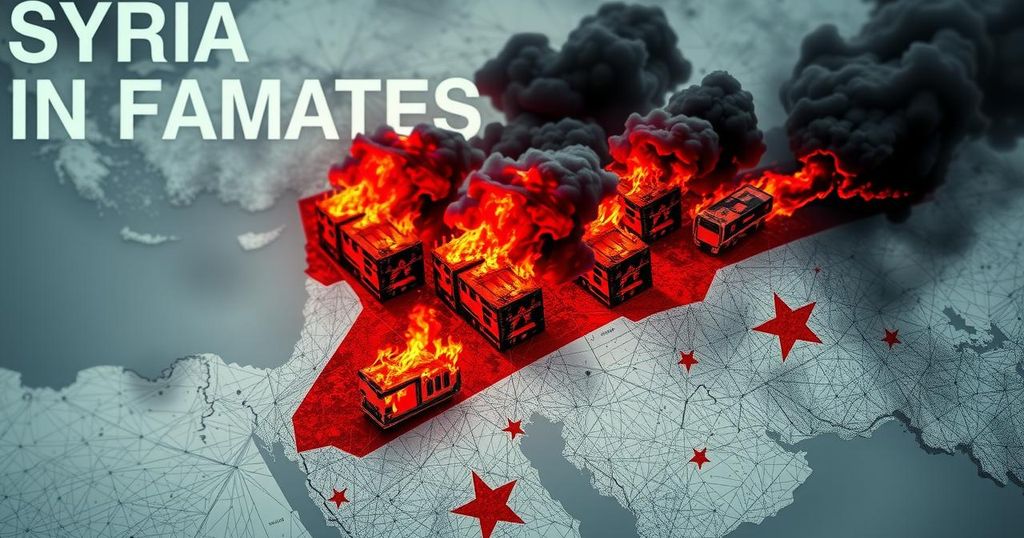The article examines the ramifications of renewed Syrian conflict for Israel, focusing on its strategic interests amid a resurgence of Sunni jihadist offensives against Assad. Israel seeks to weaken Assad but aims to avoid complete destabilization, as it prefers predictability over a chaotic power vacuum. The evolving roles of Turkey and Iran reflect broader regional tensions interconnected with this civil war, particularly in light of recent militant actions from Hamas.
The resurgence of conflict in Syria has prompted a critical evaluation among Israeli observers regarding the nature of potential threats poised along their northeastern border. With a choice between Iranian-backed Shia extremists and Turkish-supported Sunni jihadists, Israel finds itself in a delicate position of preferring neither entity’s dominance in Syria. Adopting a cautious approach, Israel has opted to refrain from direct involvement, provided its security is not compromised. Historical insights from Yitzhak Shamir during the Iran-Iraq War illustrate Israel’s strategic inclination to favor mutual attrition among adversaries, allowing both sides to weaken each other.
The renewed hostilities began on November 27, instigated by a coalition of hardened Sunni jihadists and Turkish-aligned factions against the city of Aleppo, quickly advancing toward Hama. The attack’s timing coincides with broader regional turbulence following the October 7 assault by Hamas on Israel, which not only destabilized local dynamics but also opened a front for Hezbollah against Israeli interests, displacing thousands. Following this, Israel launched Operation Northern Arrows, targeting Hezbollah’s command structure and showcasing the vulnerabilities of Iranian influence.
The context reveals a shift: Assad’s key allies, namely Russia, Iran, and Hezbollah, are currently preoccupied or diminished in capacity, presenting an opening for the rebels. Their offensive not only aims to reclaim territory but also seeks leverage amidst a broader reshaping of Middle Eastern geopolitics influenced by Hamas’s aggressive tactics. The intricate conflict landscape features a myriad of actors, with diverging interests that complicate any straightforward resolution.
While Israel perceives potential benefits from a weakened Assad, a complete destabilization could lead to unexpected chaos, which the state traditionally seeks to avoid. Consequently, Israel’s strategy is to monitor developments closely and address direct threats without engaging directly in the conflict. The ultimate aim is to maintain Syria’s inability to serve as a credible military threat while cultivating regional dynamics more favorable to Israeli national security. Israel’s preference would lean toward a regime that could align with moderate Sunni entities rather than descending into an unpredictable governance model following Assad’s collapse.
Conversely, Turkey under Erdogan exploits the situation to bolster his position regarding the Syrian refugee crisis and Kurdish threats in the region. With ongoing negotiations between Turkey and Syria stalled due to demands for troop withdrawal, Erdogan’s support for the rebels enhances his negotiating power. For Iran, this development signifies the loss of strategic footholds as the rebels threaten the continuity of arms supplies to Hezbollah. Finally, Russia’s engagement in Syria, facilitating Assad’s regime since 2015, underscores the Kremlin’s broader ambitions to project power and counterbalance US influence.
The current analysis centers on the complex dynamics of the Syrian civil war, particularly its implications for Israel amidst renewed hostilities. The article elucidates the evolving power struggles among regional players, including Israel, Turkey, Iran, and Russia, all of whom possess distinct and often conflicting interests in the outcome of the civil war. With historical context provided, this commentary seeks to explore both the strategic calculations of Israel regarding its borders and security as well as the broader geopolitical ramifications resultant from the ongoing conflict.
In summary, the toppling or weakening of Assad’s regime carries both opportunities and risks for Israel, who aims to maintain a balance that deters Iranian influence while avoiding chaos on its borders. The unpredictable nature of potential Sunni leaders raises concerns about future conflicts which Israel prefers to sidestep. Meanwhile, Turkey uses the opportunity to enhance its regional posture against various threats, while Iran and Russia confront the implications of a potentially less stable Syria. The situation underlines a complex interplay of regional strategies at a time of heightened tensions following Hamas’s assaults.
Original Source: www.jpost.com







